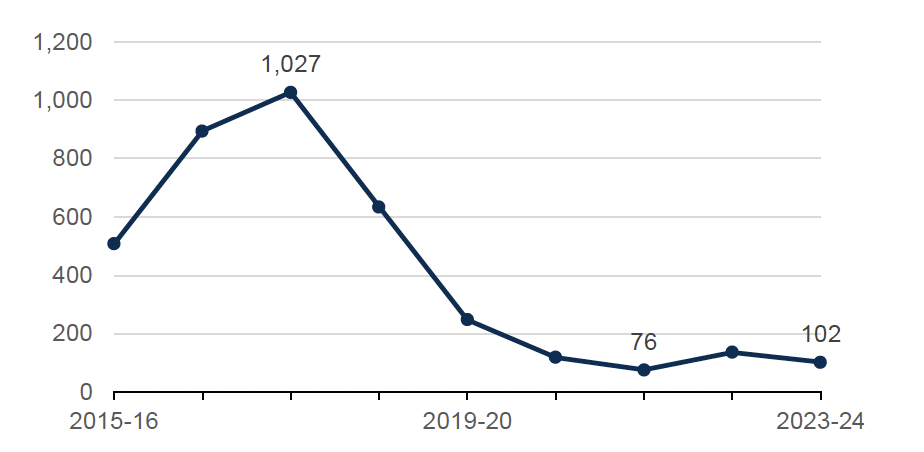Justice Social Work Statistics in Scotland: 2023-24 – Part 1
This report presents national level information on many aspects of justice social work activity, as well as the characteristics of individuals involved.
5 Fiscal work orders
(Tables 1, 4 & 5)
Key statistics for 2023-24:
- Orders commenced fell from 136 in 2022-23 to 102 in 2023-24. This was the 2nd lowest since they were introduced in 2015-16.
- Sixty-nine per cent of fiscal work orders commenced in 2023-24 were for males.
- Around 32 per cent of orders commenced were for people aged between 31 and 40.
- Of those known, just over half were reported as being unemployed.
Fiscal work orders (FWOs) were introduced nationally on 1 April 2015. They allow Procurators Fiscal to offer unpaid work orders as an alternative to prosecution. They can be for a minimum of ten and a maximum of 50 hours and should be completed within six months.

In 2023-24, there were 240 fiscal work order assessments undertaken by local authorities. In 110 of these assessments (45 per cent), the orders were accepted with the remaining 130 deemed unsuitable by local authorities. 2023-24 was the first year in which the number deemed unsuitable exceeded the number accepted. The number of orders which finished was 110, of which 81 per cent were successfully completed.
People given FWOs have been getting older in the last four years. In the years 2015-16 to 2019-20, 57 per cent of orders commenced were for people aged 25 and under, while 31 per cent were aged 26 to 40. This contrasted with the position in 2023-24, when 29 per cent were aged 25 and under and 47 per cent were aged 26 to 40.
There has also been a further change in the last five years in the employment status of people getting fiscal work orders. Where employment status was known, 51 per cent of orders commenced in 2023-24 were for people unemployed and 16 per cent for economically inactive. This compared with 35 and 7 per cent respectively in 2019-20.
People have generally been getting longer FWOs in recent years compared with previously. Sixty-seven per cent of FWOs imposed in 2023-24 were for 40 hours or more, compared to 29 per cent in 2015-16.
Contact
Email: justice_analysts@gov.scot
There is a problem
Thanks for your feedback